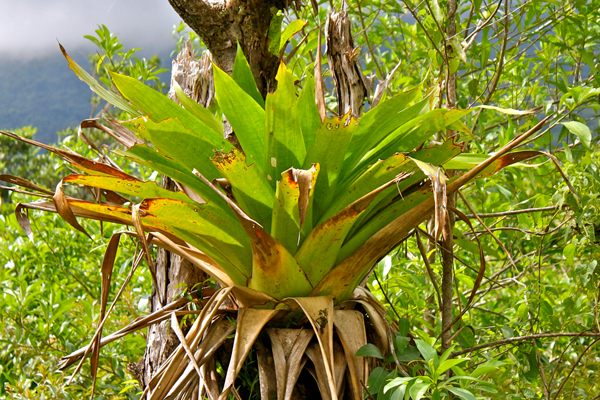06
Jun
Pesticide Use Kills Off Mosquito Predators Faster than Target Mosquitoes

Bromeliads growing on trees in tropical regions provide habitat for a range of insects //Photo credit Edd Hammill
(Beyond Pesticides, June 6, 2019) Pesticide use eliminates pest predators and permits mosquito populations to flourish, according to research conducted in Costa Rica by scientists at Utah State University. The new study, “Adaptation to agricultural pesticides may allow mosquitoes to avoid predators and colonize novel ecosystems,” highlights the dangers of human intervention through broad scale pesticide applications, and the urgent need to consider ecosystem-wide impacts before allowing chemicals to be placed on the market.
As lead study author Edd Hammill, PhD, told National Geographic, the investigation got its start after he observed higher numbers of mosquitoes in orange groves he was visiting, when compared to other, non-agricultural areas. “We felt like we were getting a lot more mosquito bites in plantations than in pristine areas and started to wonder why,” noted Dr. Hammill.
The study focuses first on the role that bromeliads, a tropical flowering plant that grows on tree branches, play in affecting mosquito populations. Mosquitoes use the water that these plants catch in between their leaves to lay eggs. Many other species are found to lay eggs within the leaves, including the top-level predator in this system, the damselfly.
Dr. Hammill’s team looked at community composition within bromeliad leaves at chemical-dependent orange plantations, organic groves, and what they considered “pristine” regions unspoiled by any agricultural production. The results were startling.
Pristine areas had 58% fewer mosquitoes than the chemical-dependent orange groves surveyed. Moreover, chemical-dependent groves have zero damselfly predators within any bromeliad plant sampled; none at all. While organic orange groves have lower levels of damselflies detected than pristine areas, they still contain a viable population of the species.
Researchers want to find out why this might be the case. Discussions with conventional farmers in the region reveal that the organophosphate insecticide dimethoate has been used for up to several decades to manage psyllid pests.
To determine whether pesticide resistance is involved, researchers tested and compared mosquitoes from chemical-intensive groves and pristine areas. Mosquitoes within chemical-dependent groves are able to endure significantly higher levels of pesticide exposure, up to ten times (10x) more than mosquitoes find in pristine areas. Although no damselflies are found in chemical-dependent groves, those in pristine areas were tested for their resistance. While damselflies are more resistant to dimethoate than mosquitoes found in pristine environments, they are significantly more sensitive than mosquitoes that had learned to tolerate the conditions at chemical-dependent farms.
Based on these data, researchers have determined that two forces are driving higher mosquito numbers in chemical-dependent orange plantations: evolutionary changes and predator release. The evolutionary driver is a result of differences in biology between mosquitoes and damselfly predators. Life cycles of the mosquitoes studied are 12 to 24 times shorter than damselflies, providing mosquitoes with a faster opportunity to develop resistant individuals. Given this short life cycle, even a small number of resistant mosquitoes can rapidly repopulate an area with their improved genetics.
Damselflies just cannot catch up in time. This further increases the dominance of mosquitoes in an ecosystem. Without predators to tamp down their populations, mosquitoes are able to colonize new habitats. In this case, mosquitoes in chemical-dependent groves are able to lay eggs in larger bromeliads, whereas in pristine areas the presence of damselflies and other predators make this highly unlikely.
The authors conclude that there is a need to, “not only study the effects of [a] stressor on individual species, but consider how stressor-mediated impacts on species affect the ecological role the species performs.”
Beyond Pesticides is working to draw increased attention to the myriad of ecological impacts pesticides can cause beyond acute effects on one species. These are known as “trophic cascades.” In an article published in summer 2018 Pesticides and You, Pesticide Use Harming Key Species Ripples through the Ecosystem, a discussion of similar impacts from conventional pesticide use leads to the conclusion that the U.S. Environmental Protection Agency must develop a “No Observed Adverse Effect Level” for ecosystem-wide effects, and remove from the market pesticides that cause these complex, cascading impacts.
This study should be a lesson for vector control operations in any area of the world, as the concepts elucidated in the study are likely to hold true in a range of ecosystems. Highly toxic synthetic pesticides should be the absolute last tool in the toolbox for pest managers, and considered only when there is an imminent public health threat. Otherwise, they are likely to do more harm than good.
For more information on safer community mosquito management, see Beyond Pesticides Mosquito and Insect-Borne Diseases webpage, including the Public Health Mosquito Management Strategy for Decision Makers and Communities.
All unattributed positions and opinions in this piece are those of Beyond Pesticides.
Source: National Geographic, Oecologia (peer-reviewed journal)










